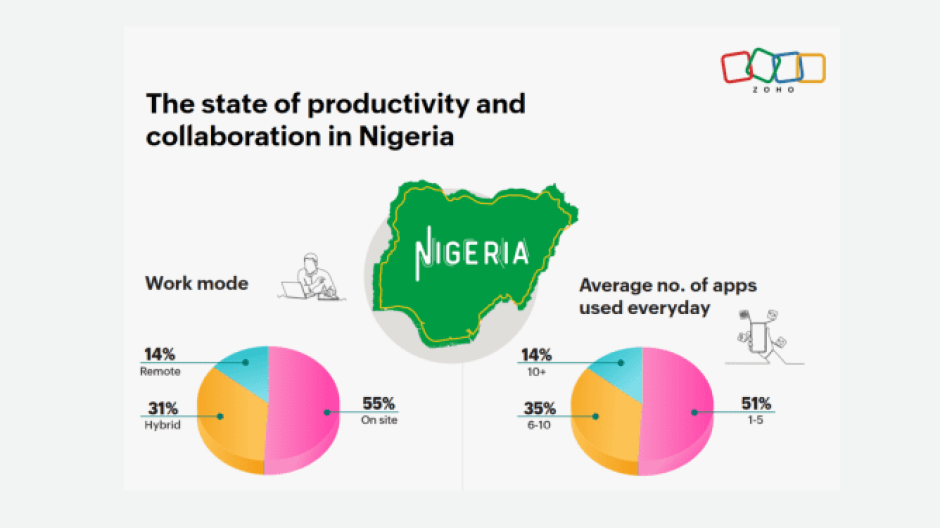While remote work has become the norm in many parts of the world, a new report by Zoho reveals that only 14% of Nigerian businesses operate fully remotely. This means the majority of businesses in Nigeria still require employees to be physically present at work, with 55% following a fully on-site model and 31% adopting a hybrid approach.
The State of Productivity and Collaboration in Nigeria 2024 report, which surveyed over 500 Nigerian organizations, sheds light on the challenges, opportunities, and barriers businesses face in adapting to modern work trends.
How Nigerian Businesses Work Today
The report highlights three key work models in Nigeria:
- Fully On-Site (55%) – Most businesses still require daily physical attendance.
- Hybrid Work (31%) – A mix of remote and in-office work, but communication struggles remain.
- Fully Remote (14%) – Only a small fraction of Nigerian businesses operate without a physical office.
Why Are More Businesses Not Going Fully Remote?
Despite the growing global shift towards flexible work, Nigerian businesses face several challenges that make remote work difficult.
Key Challenges for Remote and Hybrid Work in Nigeria
1. Too Many Apps, Not Enough Integration
The report found that Nigerian workplaces are overloaded with digital tools, leading to inefficiencies and digital fatigue.
- 51% of employees use 1–5 different apps daily.
- 35% use 6–10 apps.
- 14% rely on more than 10 apps every day.
Senior executives are the heaviest app users, with 81% of C-suite employees using more than 10 different apps daily. However, despite this high usage, only half of respondents track their tasks in a unified system, making collaboration even harder.
2. Poor Internet & Connectivity Issues
One of the biggest barriers to remote work in Nigeria is poor internet access.
- 80% of respondents reported struggling with slow WiFi and data network issues, making online meetings and real-time collaboration difficult.
Without reliable internet access, remote workers face constant disruptions, affecting productivity and workflow efficiency.
3. Digital Fatigue is Rising
The report also highlights the increasing issue of digital fatigue, where employees feel overwhelmed by constant notifications, meetings, and app-switching.
- 54% of employees reported experiencing burnout due to excessive screen time and inefficient communication tools.
For middle managers in hybrid and remote roles, this problem is even worse, as they struggle with balancing digital communication while keeping teams engaged.
How Nigerian Businesses Can Improve Productivity
Despite these challenges, businesses recognize the need for better digital solutions. The report suggests two key strategies to improve workplace productivity:
1. Unified Platforms for Workflow Management
- 78% of businesses believe in using integrated systems to streamline work.
- A single, connected platform can help reduce the time spent switching between apps and improve efficiency.
2. AI-Powered Tools for Better Efficiency
- 72% of businesses are open to AI integration to automate repetitive tasks and improve workflow.
- However, 46% of respondents cite slow AI adoption as a major barrier to competitiveness.
While fully remote work is still rare in Nigeria, the workplace is evolving. As businesses address digital fatigue, connectivity issues, and inefficient workflows, we can expect a more flexible, technology-driven work culture in the coming years.
Want to explore how startups can create better work environments? Read our latest article on workplace culture and leadership Click Here




